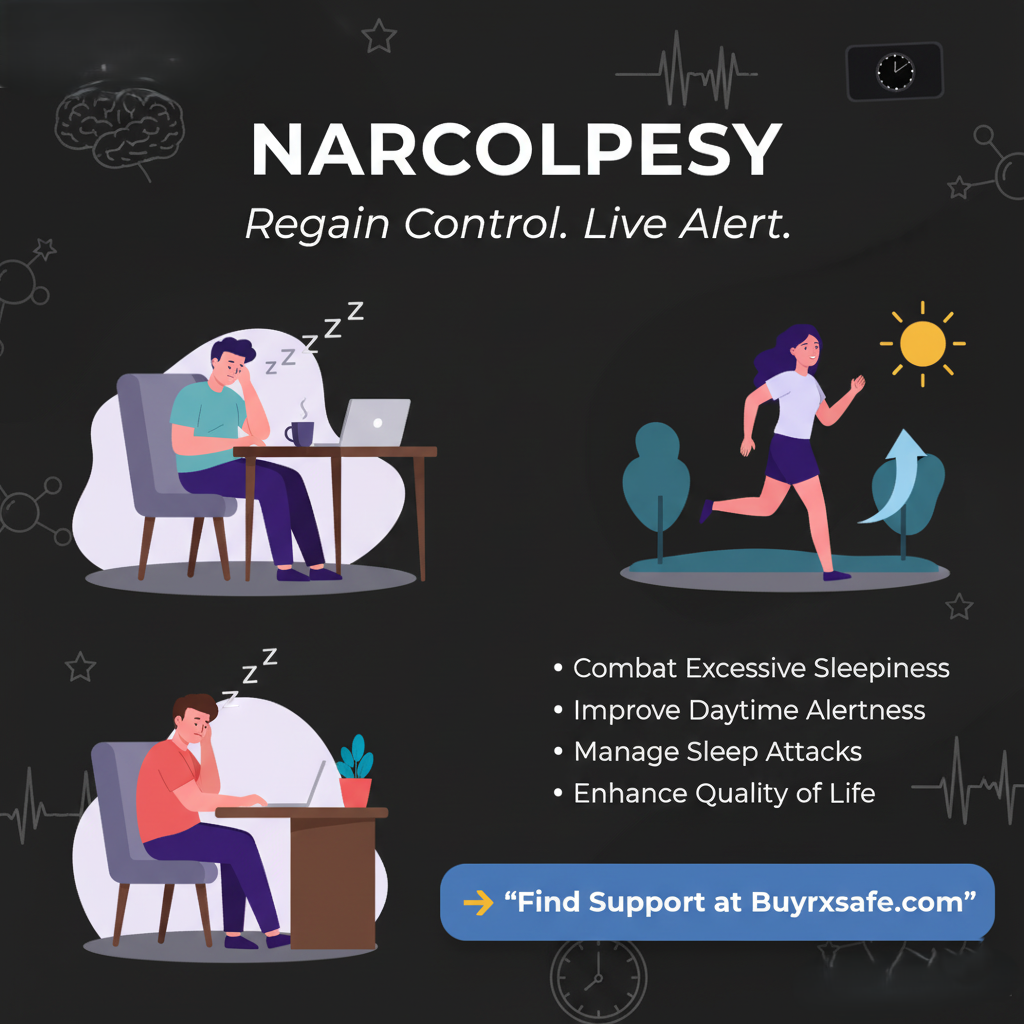Living with narcolepsy can feel like a constant struggle against extreme fatigue and sudden sleep attacks. This chronic neurological condition affects the brain’s ability to regulate sleep and wakefulness, leading to overwhelming daytime sleepiness. For individuals in the UK, Australia, and beyond, narcolepsy doesn’t just interfere with sleep patterns—it impacts work, education, and social life.
In this guide, we’ll explore the best remedies for daytime sleepiness caused by narcolepsy. From lifestyle adjustments to treatment options, you’ll find practical strategies to manage symptoms effectively. At Buyrxsafe, we understand the importance of reliable solutions that can help improve daily functioning and overall quality of life.
Understanding Narcolepsy and Daytime Sleepiness
Narcolepsy is not the same as ordinary fatigue or insomnia. It is a neurological sleep disorder that causes the brain to enter rapid eye movement (REM) sleep suddenly and at inappropriate times. People with narcolepsy often experience:
- Excessive daytime sleepiness (EDS): Feeling drowsy or falling asleep suddenly during work, driving, or conversations.
- Cataplexy: Sudden loss of muscle tone, often triggered by laughter, stress, or strong emotions.
- Sleep paralysis: Being unable to move while falling asleep or waking up.
- Hallucinations: Vivid dream-like experiences while falling asleep or waking.
The most debilitating symptom for many is daytime sleepiness, which interferes with productivity, safety, and daily life. While there’s no permanent cure, the right combination of lifestyle strategies and treatments can make a significant difference.
Best Daytime Sleepiness Remedies for Narcolepsy
1. Establish a Consistent Sleep Schedule
One of the most effective ways to manage narcolepsy is by sticking to a regular sleep routine. Going to bed and waking up at the same time every day—even on weekends—helps regulate the body’s internal clock. This consistency reduces sudden sleepiness during the day and improves nighttime rest quality.
2. Take Strategic Daytime Naps
Short, planned naps can dramatically reduce daytime fatigue. Many people with narcolepsy find that 10 to 20-minute naps restore alertness and energy. Instead of resisting drowsiness, scheduling naps during natural dips in energy levels is often more effective.
3. Prioritize a Healthy Diet
What you eat has a direct impact on energy levels. Foods high in refined sugars and processed carbohydrates can lead to energy crashes. Instead, focus on:
- Whole grains and lean proteins for steady energy.
- Fruits and vegetables for vitamins and antioxidants.
- Staying hydrated to prevent fatigue caused by dehydration.
In both the UK and Australia, nutritionists often recommend a Mediterranean-style diet, which supports stable energy throughout the day.
4. Incorporate Regular Physical Activity
Exercise helps regulate sleep-wake cycles and reduces stress, which can worsen narcolepsy symptoms. Activities like walking, cycling, or swimming boost energy levels naturally. However, avoid vigorous workouts close to bedtime as they may disrupt sleep.
5. Create a Rest-Friendly Environment
Narcolepsy makes it difficult to reach restorative sleep, so your environment should support better rest:
- Keep your bedroom cool and dark.
- Eliminate electronic distractions.
- Use supportive pillows and mattresses to enhance comfort.
6. Cognitive Behavioral Therapy (CBT) for Sleep
For some patients, CBT tailored to sleep disorders can be effective. This therapy helps reframe negative thoughts about sleep and provides techniques to manage anxiety, stress, and inconsistent sleep cycles.
7. Lifestyle Modifications for Work and Study
Narcolepsy often interferes with professional and academic performance. Practical modifications include:
- Informing employers or educators about the condition.
- Scheduling demanding tasks for times of higher alertness.
- Taking short breaks to prevent overwhelming fatigue.
Employers in the UK and Australia are legally required to make reasonable accommodations for health conditions, which may include flexible schedules.
Medical Treatments for Daytime Sleepiness
While lifestyle remedies are crucial, many individuals with narcolepsy need medical treatment to stay awake and function effectively during the day.
Wakefulness-Promoting Medications
Doctors may prescribe medications that help reduce excessive sleepiness. These treatments are designed to improve alertness without causing dependency.
Antidepressants for Cataplexy
Certain antidepressants can help control cataplexy, hallucinations, and sleep paralysis by suppressing REM sleep.
Sodium Oxybate
In some cases, sodium oxybate is prescribed to improve nighttime sleep and reduce daytime sleepiness.
If you live in the UK or Australia, always consult a sleep specialist or neurologist before starting treatment. At Buyrxsafe, we provide information on safe, reliable options for managing daytime sleepiness linked to narcolepsy.
Natural Remedies and Supportive Approaches
Some individuals prefer natural approaches alongside medical treatments. These include:
- Caffeine management: Small amounts of caffeine during the day may improve alertness but avoid late intake.
- Mindfulness and meditation: Relaxation techniques reduce stress and improve focus.
- Vitamin D and B12 supplementation: These vitamins support energy metabolism and may help reduce fatigue.
The Role of Support Systems
Managing narcolepsy isn’t just about medical treatment—it also requires emotional and social support. Connecting with local or online support groups in the UK and Australia can reduce feelings of isolation. Sharing strategies and experiences with others living with narcolepsy often helps individuals feel more understood and empowered.
Family and friends also play an important role. Educating them about the condition ensures they can offer practical help and emotional support.
Safety Considerations
Excessive sleepiness caused by narcolepsy can increase the risk of accidents, especially when driving or operating heavy machinery. Safety strategies include:
- Taking scheduled naps before driving.
- Avoiding long, monotonous journeys without breaks.
- Informing authorities or employers if drowsiness affects performance.
In both the UK and Australia, driving with untreated narcolepsy may require special medical clearance. It’s important to follow local regulations to stay safe.
Why Professional Guidance Matters
Narcolepsy is highly individualized—what works for one person may not work for another. A combination of remedies, lifestyle changes, and treatments is often needed. Consulting a healthcare professional ensures proper diagnosis, treatment, and monitoring.
At Buyrxsafe, we believe in combining safe medication access with lifestyle guidance to help individuals in the UK, Australia, and worldwide manage their symptoms effectively.
Conclusion
Narcolepsy and the resulting daytime sleepiness can be overwhelming, but with the right remedies, life can become more manageable. From lifestyle adjustments like scheduled naps and consistent sleep routines to medical treatments prescribed by specialists, there are many ways to regain control.
For individuals across the UK, Australia, and other regions, finding the right combination of strategies is key to reducing fatigue and living more fully. Whether you’re looking into medical support, natural remedies, or lifestyle modifications, it’s important to work with healthcare professionals who understand the complexities of narcolepsy.
At Buyrxsafe, we provide trusted information and reliable medication options that support better sleep management and improved quality of life. By taking proactive steps, individuals with narcolepsy can enjoy a healthier balance between rest and wakefulness.



